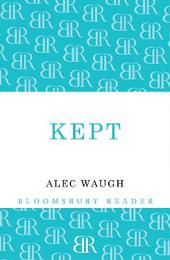
|
Kept: A Story of Post-War London
Paperback / softback
Main Details
| Title |
Kept: A Story of Post-War London
|
| Authors and Contributors |
By (author) Alec Waugh
|
| Physical Properties |
| Format:Paperback / softback | | Pages:316 | | Dimensions(mm): Height 234,Width 153 |
|
| Category/Genre | Modern and contemporary fiction (post c 1945) |
|---|
| ISBN/Barcode |
9781448201303
|
| Classifications | Dewey:823.91 |
|---|
| Audience | |
|---|
|
Publishing Details |
| Publisher |
Bloomsbury Publishing PLC
|
| Imprint |
Bloomsbury Reader
|
| Publication Date |
14 August 2012 |
| Publication Country |
United Kingdom
|
Description
A rich tale centred around the lives of Marjorie Fairfield, a beautiful and penniless young woman who is the mistress of a wealthy business man; and the symbolically named Ransom Heritage, one of the many young men who were cast adrift after the First World War ended and who has been abruptly deprived of a sense of purpose, ambition and hope. Around these young people and their circle whirls the carefree society of fashionable post-war London - a raucous, glamorous and perhaps slightly shrill world of cocktails and nightclubs, tea dances and illicit tete-a-tetes. Waugh depicts a frenetic society where all too many people are 'kept' in some way - financially, by a well-off lover, inherited capital, an unwanted husband; or more figuratively, by a reputation, a title - a relationship, even.
Author Biography
Alec Waugh, 1898-1981, was a British novelist born in London and educated at Sherborne Public School, Dorset. Waugh's first novel, The Loom of Youth (1917), is a semi-autobiographical account of public school life that caused some controversy at the time and led to his expulsion. Waugh was the only boy ever to be expelled from The Old Shirburnian Society. Despite setting this record, Waugh went on to become the successful author of over 50 works, and lived in many exotic places throughout his life which later became the settings for some of his texts. He was also a noted wine connoisseur and campaigned to make the 'cocktail party' a regular feature of 1920s social life.
|